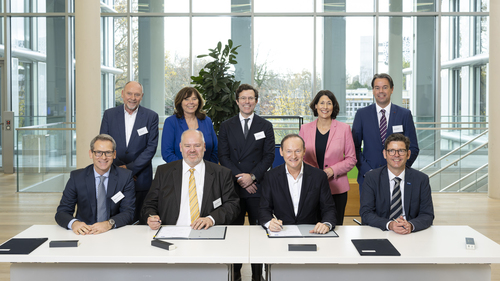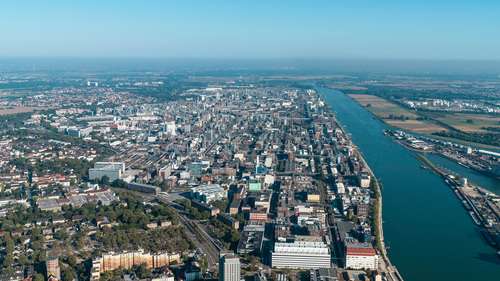Vulcan and BASF have signed a memorandum of understanding to explore the use of geothermal energy at the Ludwigshafen site, Germany
Vulcan and BASF have signed a memorandum of understanding in the presence of Daniela Schmitt, Minister of Economic Affairs, Transport, Agriculture and Viniculture for Rhineland-Palatinate, to explore the use of geothermal energy at the chemical company’s Ludwigshafen site as part of a strategic partnership. The partners aim to jointly evaluate opportunities for harnessing natural heat from deep geothermal sources to supply BASF’s largest site with renewable energy capable of meeting base load power requirements in the future. The surrounding urban centers of Frankenthal and Ludwigshafen also stand to benefit from the sustainable heat and are participating in the necessary seismic surveys as a first step. In order to make optimal use of synergy effects from the project, Vulcan plans to build a lithium extraction plant for the production of green lithium.
The geology of the Upper Rhine Graben gives the Rhine Valley region enormous geothermal potential. Assuming that the exploratory work is successful, heat pumps could be used to take advantage of the area’s geothermal energy to generate CO2-free steam. With a potential output of 300 megawatts of thermal energy, around 4 million metric tons of this crucial energy carrier for the chemical industry could be produced at the BASF site in Ludwigshafen every year – without the use of fossil fuels. This would prevent the emission of approximately 800,000 metric tons of CO₂, making a significant contribution to reducing greenhouse gas emissions at BASF’s main site.
In addition to providing renewable heat, Vulcan plans to produce sustainable lithium for the German and European battery and automotive industries as part of the project. The geothermally heated water in the Upper Rhine Graben boasts a high concentration of this light metal, which is mainly used to produce lithium-ion batteries for applications such as smartphones, laptops, and electric cars. BASF would first use the hot thermal water to generate steam, Vulcan would then extract lithium using a resource-efficient process known as adsorption-type direct lithium extraction (A-DLE). With this in mind, the two partners are currently examining the possibility of building a lithium extraction plant at BASF’s site at a later date.
Besides its potential for industrial use, deep geothermal energy also offers opportunities for generating district heating. Harnessing this energy could constitute an important step on the road to a successful heat transition at a municipal level. Vulcan and BASF are therefore working together with regional energy suppliers – Technische Werke Ludwigshafen and Stadtwerke Frankenthal – to evaluate whether the geothermal energy made available through the project can be used to supply low-emission heating for households in the two urban areas they serve.
“We want to supply our Ludwigshafen site with CO2-free steam in the future. In addition to harnessing the waste heat from our production facilities, where possible, we want to consider renewable heat sources from geothermal structures,” says Uwe Liebelt, President European Verbund Sites, BASF SE. “In Vulcan, we have a partner on board who has the necessary technological expertise in exploiting geothermal heat to plan and implement such a complex project. Deep geothermal energy not only offers enormous potential for our own energy transformation. If the project is successful, we will set an excellent example for how we can shape the energy transition in the Rhine-Neckar Metropolitan Region through close cooperation between politicians, energy suppliers, and the industrial sector and leverage benefits for all parties.”
“It’s good that the private sector is taking steps to develop innovative technologies with a view to successfully transforming our economy and improving our international competitiveness. By using domestic energy resources, we can reduce our dependency on energy imports and be less vulnerable to the highly volatile energy prices on the world market. That is why I strongly welcome the collaborative projects being undertaken by the two companies with the involvement of the wider economy and local municipalities. Our goal must be to establish Germany and the State of Rhineland-Palatinate as internationally competitive industrial locations with internationally competitive energy prices. I will continue to press the German federal government and the EU for a much-needed ‘Industrial Deal’,” said the Rhineland-Palatinate Minister for Economic Affairs, Daniela Schmitt, in Ludwigshafen. Together with BASF and around 50 other companies, Minister of Economic Affairs, Daniela Schmitt, has developed a “Rhineland-Palatinate Declaration of Energy-Intensive Companies”, in which the use of new technologies – including geothermal energy – also plays a role. “We will also take these demands and proposed measures to Brussels together in early 2025.”
“With this project, Vulcan aims to make a significant contribution to reducing CO₂ emissions from the region’s industrial sector. Supplying energy from renewable heat sources to the companies located in the Upper Rhine Valley is a cornerstone of our project development strategy. Our aim is to realize project models like this one with BASF that will allow us to both harness geothermal energy and extract carbon-neutral lithium along the length of the Upper Rhine Valley. The associated reliable supply of heating for the region’s population would also deliver an important locational advantage,” explains Thorsten Weimann, Chief Development Officer at Vulcan Energie Ressourcen GmbH.
“BASF is a leading global chemical company and plays a very important role in the region. We are delighted to support BASF in its efforts to achieve a carbon-neutral energy supply for its headquarters in Ludwigshafen. The partnership between Vulcan and BASF is a clear demonstration that the combination of geothermal energy and carbon-neutral lithium production not only makes environmental sense but can deliver economic benefits for both companies as well as positive impacts for the people in the region,” says Cris Moreno, Managing Director and CEO of Vulcan Energy Resources.
The next step is to carry out a seismic survey to investigate the geothermal conditions in a subregion of the Upper Rhine Graben. Vulcan will be the active project developer, carrying out the exploration and acting as the technical lead. The initial exploratory work is currently scheduled to begin in early 2025.
Categories
Investments
2025-03-01
at BASF SE, Ludwigshafen (DE)Countries
Companies
Latest news
INEOS launches €250m investment supported by the French Government to secure the future of French industry at Lavera
The project marks the first phase of a long-term regeneration plan to reduce emissions, boost reliability, efficiency and competitiveness, with support of the French State.
Hycamite’s technology to decarbonize shipping awarded AiP by industry leader DNV
Kokkola Industrial Park →Hycamite’s proprietary Thermo-Catalytic Decomposition (TCD) technology offers a new approach to producing clean hydrogen by breaking down methane, the primary component of liquefied natural gas (LN...
Clariant catalysts will power the Ecoplanta: Europe's first waste-to-methanol plant
Chemmed Cluster Tarragona →Repsol is building Europe’s first plant to produce renewable methanol from urban waste The facility will use Enerkem gasification technology to produce 240 KTA of methanol Clariant will supply cata...
Lilly plans to build a new $3 billion facility to boost oral medicine manufacturing capacity in Europe for patients worldwide
Netherlands site will bring 500 manufacturing and 1,500 construction jobs while further strengthening Lilly's global supply chain



